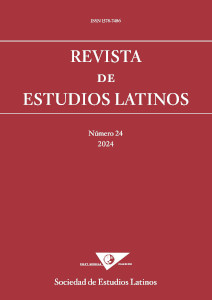The Polysemic Development from Latin to Romance of gausapātus ‘covered with a fine hair’
DOI:
https://doi.org/10.23808/rel.v24i.112170Keywords:
Rural metaphors, baby mammals, lexicalisation, suffixation, proto-RomanceAbstract
Like gausăpa ‘a woollen material, shaggy on one side’, the adjective gausapatus ‘covered with fine hair’ does not seem to have survived through to the Romance languages, or so it seems from the fact that Latinists and Romanists have remained silent on the matter for centuries. However, evidence from Petronius and perhaps from Seneca are enough for us to suspect its transformation into Sp. gabato ‘young of the deer, the hare and the wild boar (jabato)’ and to suggest that the *-attvM suffix is a morphologisation of the two final syllables: lvp(vM *gavsap)attvM > It. lupatto. This form is documented in the central and western areas of the Roman Empire in particular, making it Proto-Romance in nature. The metaphorical use of both the Latin adjective and the noun in rural areas saved them from having met their end in Antiquity.
Downloads
References
Bibliografía
Álvarez Pérez, X. A. (2006): «Contribuciones al estudio del léxico de la vaca: denominaciones para la cría», Villayandre Llamazares, M. (ed.), en Actas del XXXV Simposio nternacional de la Sociedad Española de Lingüística, León, Universidad de León, 66–87.
Armisen-Marchetti, M. (2006): «Un terme argotique chez Sénèque? À propos de gausapatus (Ep. 53, 3)», en Santini ,C., Zurli, L. & Cardinali, L. (eds.), Concentus ex dissonis: scritti in onore di Aldo Setaioli, I. Quaderni del dipartimento di filologia e tradizione Greca e Latina, Nápoles, 4, 35–47.
Brüch, J. (1926): «Das Suffix -attus, -ittus, -ottus», Revue de linguistique romane, 2, 98–112.
Cioranescu, A. (1966 [1958]): Diccionario etimológico rumano, Tenerife, Universidad de La Laguna.
CGL = Loewe, G. & Goetz, G., eds. (1965): Corpus Glossariorum Latinorum, i–vii, Amsterdam, Hakkert.
DALLA = Diccionariu de la Llingua Asturiana, ‹http://www.academiadelallingua.com/%20diccionariu/ ›.
DECat = Coromines, J. (1980–2001): Diccionari etimològic i complementari de la llengua catalana, Barcelona, Curial Edicions.
DECH = Corominas, J. & Pascual, J. A. (1980–1991): Diccionario crítico etimológico castellano hispánico, Madrid, Gredos.
DGLA = García Arias, X. L. (2024): Diccionario general de la lengua asturiana, Oviedo, Editorial Prensa Asturiana. ‹ https:mas.lne.es ›.
Díaz y Díaz, M. C. (1968): Petronio Árbitro, Satiricón, Barcelona, Alma Mater.
DLE = Real Academia Española (201423): Diccionario de la lengua española, Madrid, Espasa-Calpe. ‹ https://dle.rae.es/ ›.
DELI = Cortelazzo, M. & Zolli, P. (2008): Dizionario etimologico della lingua italiana, Bolonia, Zanichelli.
Du Cange, Ch. (1954 [1678]): Glossarium mediae et infimae latinitatis, Graz, Akademische Druck- u. Verlagsanstalt.
Forcellini, A. (1965 [1771]): Lexicon totius latinitatis, Florencia, Forni.
García de Diego, V. (1985): Diccionario etimológico español e hispánico, Madrid, Espasa-Calpe.
G-H = García-Hernández, B. (2006): «El origen latino de jabato, gabato y gazapo», Revista de Filología Española, 86, 277–292.
G-H = García-Hernández, B. (2007): «Lat. apros gausapatos (Petron. 38, 15), esp. jabatos. El romance en auxilio del latín», en Hinojo Andrés, G. & Fernández Corte, J. C. (eds.), Munus quaesitum meritis. Homenaje a Carmen Codoñer, Salamanca, Ediciones Universidad de Salamanca, 369–378.
Puşcariu, S. (1905): Etymologisches Wörterbuch der rumänischen Sprache, Heidelberg, Winter.
Reynolds, L. D. (1977): L. Annaei Senecae Dialogorum libri duodecim, Oxford University Press.
Rohlfs, G. (1938): «Zum aragonesischen», Zeitschrift für romanische Philologie, 552–559.
Rohlfs, G. (1969): Grammatica storica della lingua italiana e dei suoi dialetti. iii Sintassi e formazione delle parole, Turín, Einaudi.
TLL = Academiae quinque Germanicae (1900…), Thesaurus linguae latinae, Leipzig, Teubner / Berlín, De Gruyter.
Velázquez Soriano, I. (2022): «Gausapa/-es, gaunaca/-um, galnapes, gaunapa: Una contaminación consolidada en latín tardío», en González Rolán, T. & al. (eds.), Pinguis Humus, Estudios dedicados a Francisca Moya del Baño, Madrid, Ediciones Clásicas, 173–193.
Wagner, M. L. (1920): «Amerikanisch - Spanisch und Vulgärlatein». Zeitschrift für romanische Philologie, 40, 286–312, 385–404.
Downloads
Published
How to Cite
Issue
Section
License
Copyright (c) 2024 Revista de Estudios Latinos

This work is licensed under a Creative Commons Attribution-NonCommercial-NoDerivatives 4.0 International License.
The originals published in the printed and electronic editions of this journal are the property of the Revista de Estudios Latinos and can be circulated as long as the original source and authorship is made clear in any reproduction, full or partial, of the same, and as long as this is not done for commercial purposes.






